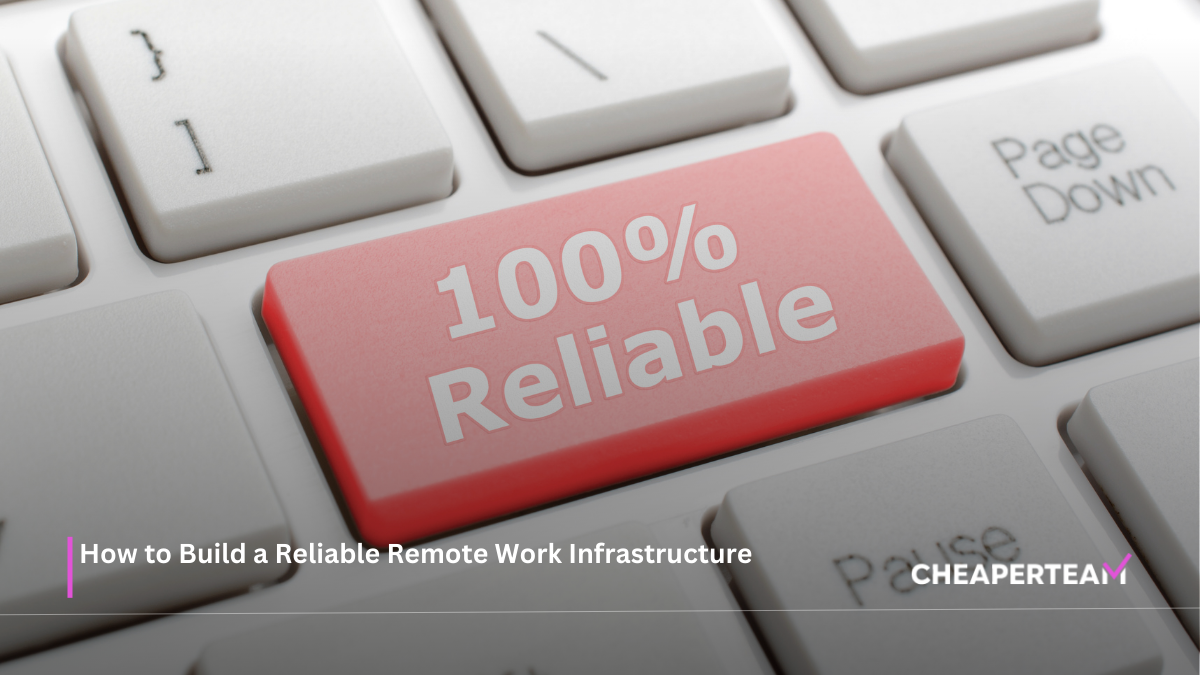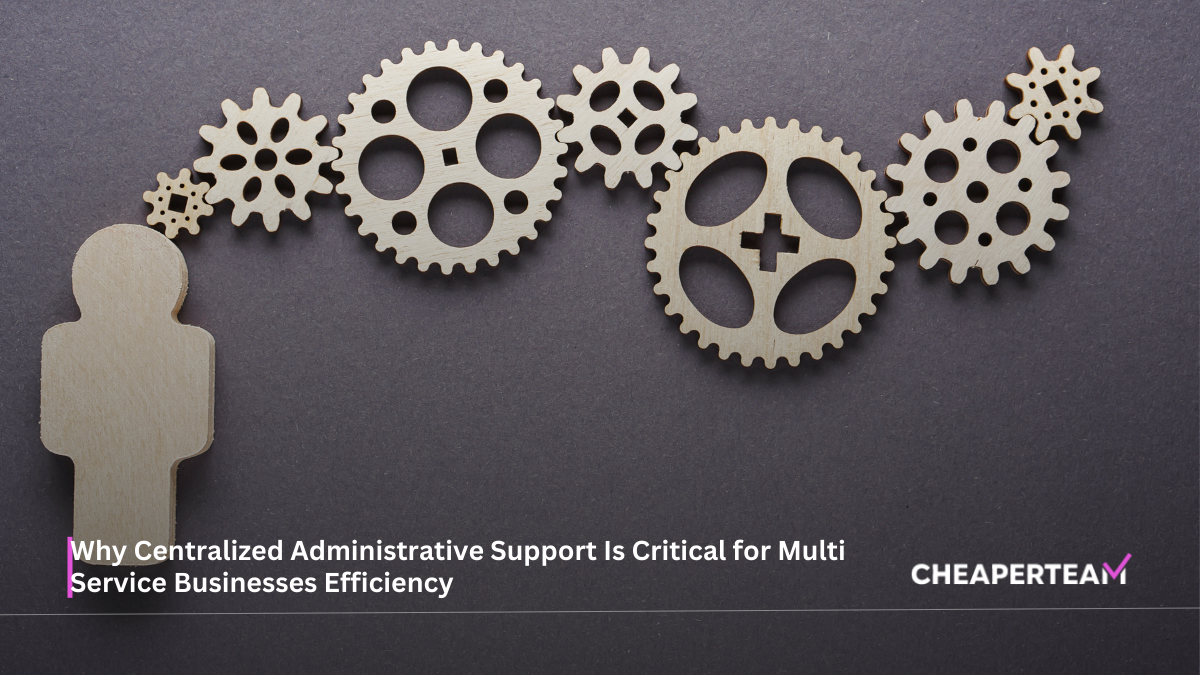A reliable remote work infrastructure has become essential for modern businesses. As teams grow, workflows expand, and responsibilities shift to virtual environments, the systems that support remote work must be organized, secure, and easy to use. With the right structure in place, businesses operate smoothly, communicate clearly, and maintain strong productivity regardless of physical location.
CheaperTeam helps companies build and maintain dependable remote systems by providing trained remote professionals who support operations, communication, documentation, and daily workflow management. This blog explains how to build a reliable remote work infrastructure that supports long-term efficiency, stability, and growth.
READ ALSO:
> Outsourcing Virtual Assistant: Streamlining Business Efficiency and Productivity
> 1 Business Outsourcing – 5 Signs Your Business is Ready for Outsourcing
> Why Outsourcing HR Services is Crucial for the Success of Your Business #1
🏢 Understanding the Importance of a Remote Work Infrastructure
A remote work infrastructure refers to the systems, tools, processes, and communication methods that allow teams to collaborate effectively from any location. When this infrastructure is strong, businesses experience fewer disruptions and maintain consistent quality across all tasks.
A strong infrastructure helps businesses:
• Improve workflow coordination
• Maintain clarity across the team
• Protect sensitive data
• Increase productivity
• Reduce communication delays
• Support scalability
• Strengthen accountability
Without the right structure, remote teams struggle with confusion, misalignment, and delays. With it, they work confidently and efficiently.

🖥️ Choosing the Right Tools for Remote Work
Tools form the foundation of a successful remote operation. Businesses must use software that supports communication, file sharing, task management, and collaboration.
Common categories of remote tools include:
• Messaging and communication
• Video conferencing
• Project management
• File storage
• Password management
• Time tracking
• Support and ticketing systems
A well-selected toolset ensures that team members can perform tasks smoothly and stay connected, no matter where they are located.
📡 Creating Stable Communication Channels
Clear communication is essential for remote teams. Without face-to-face interaction, businesses must rely on structured methods that prevent misunderstandings and keep everyone aligned.
Strong communication channels support:
• Daily collaboration
• Quick decision-making
• Transparent updates
• Smooth project handoffs
• Better teamwork
When communication is stable, remote workflows become predictable and reliable.
📋 Documenting Workflows and Standard Operating Procedures
Documentation plays a critical role in building a solid remote work infrastructure. It ensures that every team member understands expectations, responsibilities, and processes.
Effective documentation should include:
• Step-by-step workflow guides
• Standard operating procedures
• Communication guidelines
• Checklists for recurring tasks
• Onboarding information
• Resource lists
Clear documentation reduces confusion and helps new team members integrate faster. CheaperTeam assists businesses in building detailed documentation that supports long-term consistency and productivity.
🔐 Prioritizing Data Security and Access Management
Remote work expands access points and increases the importance of strong security measures. Businesses must control who can access information, how data is protected, and how risks are minimized.
Security components include:
• Encrypted file sharing
• Strong passwords
• Controlled access permissions
• Secure communication tools
• Regular backups
• Clear data handling guidelines
A secure remote infrastructure protects sensitive information and maintains business integrity.
🗂️ Organizing Digital Files and Resources
Digital organization is essential for remote efficiency. When files are easy to find, share, and update, team members complete tasks faster and make fewer mistakes.
A strong digital system includes:
• Structured folder hierarchies
• Consistent naming conventions
• Centralized storage
• Shared reference materials
• Updated versions of documents
Organized digital spaces help remote teams work with confidence and avoid unnecessary delays.
⏱️ Implementing Time Management and Productivity Systems
Time management ensures that remote workers remain accountable, productive, and balanced. It also helps managers track progress and identify areas for improvement.
Remote productivity systems may include:
• Time tracking tools
• Daily check-ins
• Prioritized task lists
• Scheduled focus blocks
• Weekly progress reviews
These systems create predictable workflows and help teams stay aligned. CheaperTeam remote professionals are trained in time management tools that support productivity and clarity.
📊 Setting Clear Expectations and Performance Standards
To build a reliable remote infrastructure, employees must know what is expected of them. Clear expectations reduce confusion and increase consistency across all tasks.
Performance standards may include:
• Task deadlines
• Quality expectations
• Reporting schedules
• Communication frequency
• Productivity metrics
Defined standards create structure, helping remote team members perform confidently and independently.
📞 Providing Ongoing Support for Remote Team Members
Remote teams need regular support to stay connected and motivated. A strong infrastructure includes systems for assistance, feedback, and professional development.
Ongoing support includes:
• Accessible help channels
• Routine check-ins
• Training opportunities
• Problem-solving guidance
• Encouragement and recognition
These support systems strengthen team morale and ensure that remote employees feel valued and equipped.
🧩 Ensuring Flexibility and Scalability in the Infrastructure
A reliable remote work infrastructure must adapt as the business grows. Flexible systems allow companies to add new tools, team members, and workflows without major disruptions.
Scalable infrastructure benefits businesses by:
• Allowing smooth team expansion
• Supporting new client demands
• Improving adaptability
• Reducing the need for major restructuring
CheaperTeam assists businesses in building systems that grow with them and remain stable over time.
🔧 Leveraging CheaperTeam to Strengthen Remote Infrastructure
CheaperTeam provides skilled remote professionals who help businesses build, maintain, and optimize remote systems. With experience in documentation, tools, communication, and operations, they help companies operate smoothly and efficiently.
CheaperTeam support includes:
• Workflow management
• Process documentation
• Task coordination
• Administrative assistance
• Digital organization
• Communication support
• Team alignment
Businesses gain efficiency, clarity, and stability with dedicated remote experts supporting their daily operations.
💬 FAQs About Remote Work Infrastructure
1: What is the main purpose of a remote work infrastructure?
It provides structure, tools, and systems that allow teams to collaborate efficiently from different locations.
2: Do small businesses need a developed remote infrastructure?
Yes. Even small teams benefit from organized communication, documentation, and workflow systems.
3: How does documentation help remote teams?
It reduces confusion, clarifies responsibilities, and supports consistent performance.
4: What tools are essential for remote work?
Common tools include communication software, project management platforms, file storage systems, and time tracking tools.
5: How can CheaperTeam help build remote infrastructure?
CheaperTeam provides trained remote professionals who support workflows, documentation, productivity systems, and day-to-day operations.
CheaperTeam is a European based outsourcing company with headquarters centrally located in the heart of Manhattan, NY. Our objective is to provide high-quality, motivated employees while maintaining cost efficiency for businesses. We offer a boutique style of doing business, allowing flexibility in vetting and sourcing employees for various industries. Our staff comprises data entry specialists, medical billers, interior designers, back-office employees, and virtually any position that can be executed remotely.




